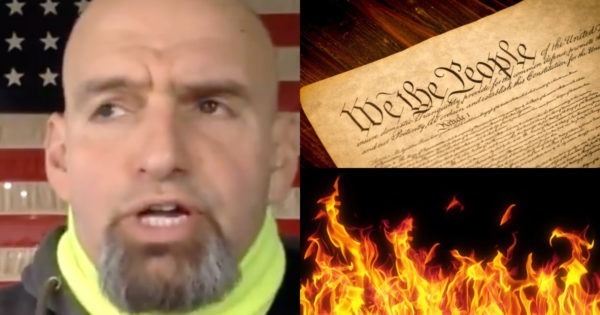
In a video released by The Hill on Twitter, Pennsylvania Lieutenant Governor John Fetterman said that “you do not have the right” to question the legitimacy of the 2020 US election.
The Constitution does not protect you from expressing your political opinion regarding the legitimacy of a US election, according to Pennsylvania Lieutenant Governor John Fetterman.
Fetterman also said that censorship of President Donald Trump at the hands of Big Tech is “not deplatforming someone. It’s deleting lies that are yelling fire in a crowded theater when there is none.”
“That is not protected speech,” said Fetterman. “No one, Republican, Democrat, whatever, has the right to say those kind of incendiary lies”
Pennsylvania Lt. Gov. John Fetterman: "This idea that saying that Pennsylvania was 'rigged' or that we were 'trying to steal the election' — that's a lie. And you do not have the right, that is not protected speech." pic.twitter.com/2f2ERSSLXy
— The Hill (@thehill) January 15, 2021
Fetterman should know that the phrase “shouting fire in a crowded theater” originates from Schenck v. US (1919).
Schenck was overturned over 50 years ago in Brandenburg v. Ohio (1969).
In Brandenburg, the Supreme Court ruled that speech may be prohibited if it is “directed at inciting or producing imminent lawless action” and is “likely to incite or produce such action.” The Supreme Court essentially utilized a combination of the “Clear and Present Danger Test” and the “Incitement Test” in their Brandenburg decision.
Critics of President Trump such as Democrats, RINO’s, those in the mainstream media, Big Tech, and the Deep State point to his January 6 ‘Stop The Steal’ speech as an example of the President using unprotected speech, inciting insurrection, and encouraging violence. However, if you read the full transcript, it is evident that such claims are over-exaggerated and outright untrue.
“Anyone you want, but I think right here, we’re going to walk down to the Capitol, and we’re going to cheer on our brave senators and congressmen and women, and we’re probably not going to be cheering so much for some of them.
Because you’ll never take back our country with weakness. You have to show strength and you have to be strong. We have come to demand that Congress do the right thing and only count the electors who have been lawfully slated, lawfully slated.
I know that everyone here will soon be marching over to the Capitol building to peacefully and patriotically make your voices heard,” said President Trump.
President Trump was permanently banned of Twitter on January 8. However, the Trump Twitter Archive and Gab have saved all of his tweets. Upon further analysis, it is clear that every tweet that the President had posted since January 6 was not “directed at inciting or producing imminent lawless action” at all, and quite frankly, both speech and his tweets suggested the complete opposite.
In one tweet, the President wrote:
“I am asking for everyone at the U.S. Capitol to remain peaceful. No violence! Remember, WE are the Party of Law & Order – respect the Law and our great men and women in Blue. Thank you!” – President Trump, January 6, 2020, 3:13:26 PM EST.
This made Twitter’s decision to remove President Trump’s messages of peace that much more confusing, as National File reported.
BREAKING: Twitter deletes Trump's video calling for peace pic.twitter.com/34rWBwbZVh
— Jack Posobiec
(@JackPosobiec) January 6, 2021
Twitter continues to be allowed to infringe on our freedom of speech, courtesy of Section 230 and weak Senate Republicans. However, government officials – including Fetterman, must still abide by the Constitution despite their open objections.
Since Pennsylvanians are assuming that Fetterman will continue to use his outdated “yelling fire in a crowded theater” reference to Schenck, as he works to diminish protections given to Americans by the First Amendment, the American many acre curious to know specifically how:
1) questioning the results of an election, where evidence of fraud was paramount, is “directed at inciting or producing imminent lawless action” and is “likely to incite or produce such action.”
2) the President’s January 6 speech and most recent tweets were “directed at inciting or producing imminent lawless action” and were “likely to incite or produce such action.”
Many would say that deeming phrases such as “remain peaceful, No violence!” or “the election was rigged” as unprotected speech, highlights a very loose interpretation of the First Amendment. As the Constitution stands, questioning the results or legitimacy of the 2020 election is still classified as protected speech.
Confidence in the legitimacy of US elections will not be restored if the government, corporations, and the media punish those who discuss such concerns. One could only imagine the public outcry that would ensue if President Trump or Republicans legally punished anyone for claiming that the Russia-hoax held any basis in fact.
One thing is for certain, the fixers who oversaw election operations for Tammany Hall in the 19th Century would undoubtedly agree with Fetterman’s interpretation of the First Amendment.